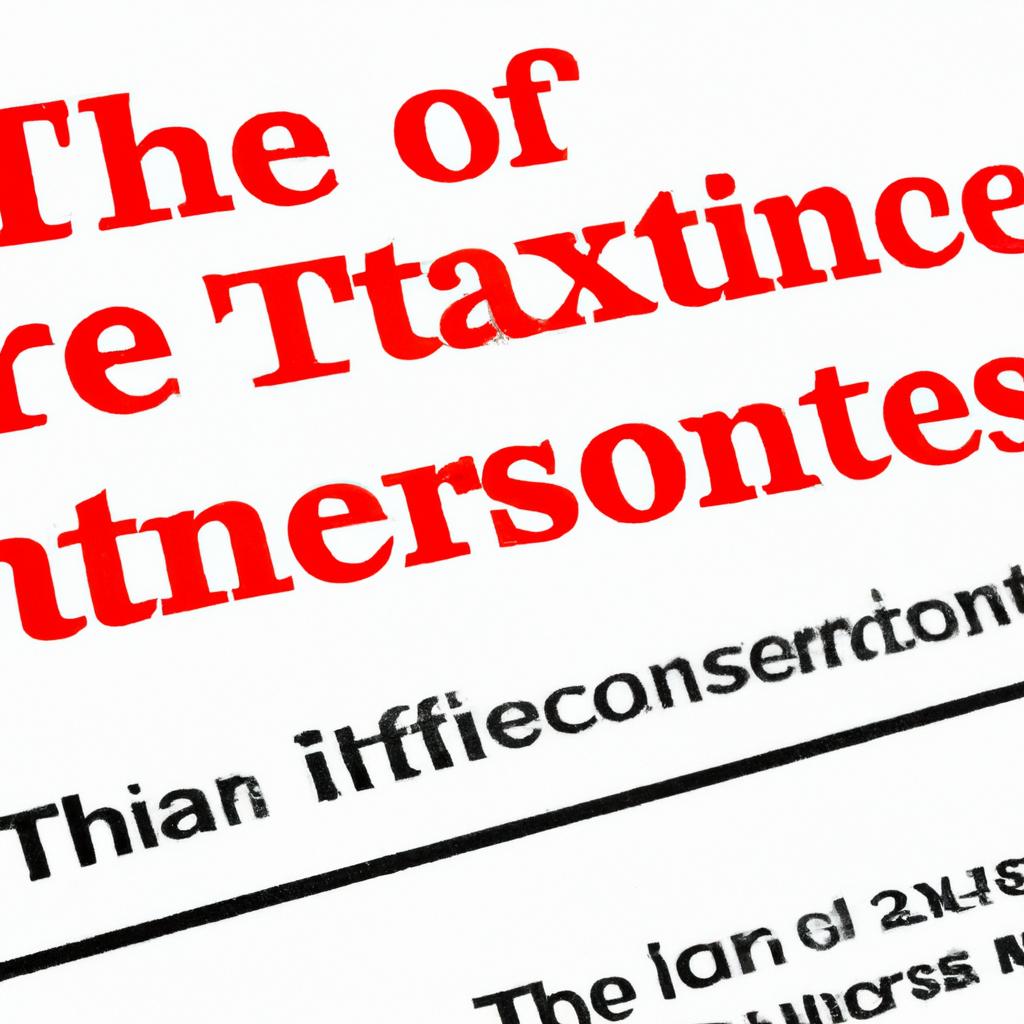In the realm of estate planning, the 7-year rule stands as a pillar of significance and consideration. As seasoned practitioners in the field of law, the team at Morgan Legal Group in New York City is well-versed in guiding clients through the intricacies of this rule and its implications on estate and trust planning. Join us as we delve into the nuances of how the 7-year rule operates, offering insights and expertise derived from years of experience in probate, elder law, Wills, and trusts.
Understanding the Legal Foundation of the 7-Year Rule
When it comes to estate planning, is crucial. This rule plays a significant role in determining the inheritance tax liability of an individual’s estate. Essentially, any gifts made by an individual within 7 years of their death may be subject to inheritance tax if they exceed the allowable threshold. It is important to have a clear understanding of how this rule works to ensure that your estate planning efforts are in compliance with the law.
Under the 7-year rule, gifts made by an individual will only be considered for inheritance tax purposes if they were made within 7 years of their death. However, there are exceptions to this rule, such as gifts made to a spouse or to charity, which are typically exempt from inheritance tax. It is important to review your estate planning strategy with a qualified attorney to ensure that you are taking full advantage of the legal provisions surrounding the 7-year rule and minimizing your tax liability.

Implications of the Rule on Inheritance and Taxation
When it comes to navigating the complex world of inheritance and taxation, understanding the implications of the 7-year rule is crucial. This rule, also known as the “Seven-year Inheritance Tax rule,” pertains to the gifts you make during your lifetime and how they may be subject to inheritance tax if you pass away within seven years of making the gift. It is important to comprehend how this rule works to effectively plan your estate and minimize potential tax liabilities.
Under the 7-year rule, gifts made by an individual are considered potentially exempt transfers (PETs) if they are made more than seven years before the donor’s death. This means that if the donor survives for at least seven years after making the gift, it will not be subject to inheritance tax. However, should the donor pass away within seven years of making the gift, the value of the gift may be included in their estate for tax purposes. Planning ahead and seeking advice from an experienced estate planning attorney can help you navigate the complexities of this rule and make informed decisions about your assets and gifts.

Strategic Planning Considerations for Estate Distribution
When it comes to estate distribution, one of the key considerations to keep in mind is the 7-year rule. This rule pertains to gifts made by an individual before their passing. In essence, any gifts made by the individual will not be considered part of their estate for inheritance tax purposes if they survive for at least 7 years after making the gift. This can be a crucial factor in estate planning, as it can help reduce the overall tax liability of the estate.
It is important to note that there are some exceptions to the 7-year rule that should be taken into account when planning for estate distribution. For example, gifts made within 7 years of the individual’s passing may still be subject to inheritance tax if they exceed the allowable thresholds. Additionally, certain types of gifts, such as gifts to a trust or gifts with a reservation of benefit, may also be included in the estate for tax purposes. As such, it is essential to consult with a qualified estate planning attorney to ensure that your estate distribution plan takes full advantage of the 7-year rule and accounts for any potential exceptions.

Navigating Complexities and Exceptions in the Application of the Rule
Navigating the complexities and exceptions in the application of the rule can be a challenging task, especially when it comes to understanding the intricacies of the 7-year rule. This rule, commonly known as the “seven-year rule,” refers to the period of time in which certain gifts are exempt from inheritance tax. However, there are several factors and exceptions that must be taken into consideration when applying this rule in practice.
One key factor to consider is the concept of “Potentially Exempt Transfers” (PETs) in relation to the 7-year rule. This refers to gifts made by an individual that may become exempt from inheritance tax if the individual survives for at least 7 years after making the gift. However, if the individual passes away within this period, the gift may be subject to inheritance tax. It is important to carefully evaluate the timing and nature of gifts to determine their tax implications under the 7-year rule. Additionally, certain types of gifts, such as those involving trusts or businesses, may have unique considerations and exceptions that can impact their treatment under the rule.
Q&A
Q: What is the 7-year rule?
A: The 7-year rule refers to the widely accepted belief that negative information on your credit report will be automatically removed after 7 years.
Q: How does the 7-year rule work in relation to credit reports?
A: The 7-year rule dictates that most negative information, such as late payments, bankruptcies, and collections accounts, can only remain on your credit report for a maximum of 7 years.
Q: Does the 7-year rule apply to all types of negative information on a credit report?
A: The 7-year rule generally applies to most types of negative information. However, some exceptions include bankruptcies, tax liens, and judgments, which can remain on your credit report for longer periods of time.
Q: How does the 7-year rule affect my credit score?
A: As negative information ages and eventually falls off your credit report due to the 7-year rule, your credit score may improve over time. This is because lenders typically view older negative information as less concerning compared to recent negative information.
Q: Are there any ways to dispute negative information that exceeds the 7-year rule?
A: If you believe that negative information on your credit report is inaccurate or has exceeded the 7-year rule, you can file a dispute with the credit reporting agencies to have the information removed.
Q: How can individuals use the 7-year rule to improve their credit standing?
A: By staying current on payments, managing credit responsibly, and being proactive in addressing any inaccuracies on their credit report, individuals can leverage the 7-year rule to gradually improve their credit standing over time.
To Conclude
In conclusion, the 7-year rule is a simple yet important principle to consider when managing your finances and making decisions about your credit history. By understanding how this rule works, you can take proactive steps to improve your credit score and overall financial well-being. Remember, time is a powerful tool when it comes to rebuilding credit and moving towards financial freedom. So, use the 7-year rule to your advantage and pave the way towards a brighter financial future. Thank you for reading!
 How Does the 7-year Rule Work?
How Does the 7-year Rule Work?
We often hear the phrase “time heals all wounds,” and when it comes to credit reporting, this statement holds some truth. The 7-year rule, also known as the negative information rule, is a crucial aspect of credit reporting that plays a significant role in determining your credit score. But just what is the 7-year rule, and how does it work? In this article, we’ll delve deeper into this credit reporting rule to help you understand its impact on your credit history and financial well-being.
Understanding the 7-year Rule
To understand how the 7-year rule works, let’s first define it. Simply put, the 7-year rule is a provision in the Fair Credit Reporting Act (FCRA) that limits the amount of time negative information can remain on your credit report. This negative information includes late payments, accounts in collections, bankruptcies, foreclosures, and other factors that can negatively impact your credit score.
According to the FCRA, credit reporting agencies (CRAs) are required to remove negative information from a consumer’s credit report after seven years. This means that the negative information will no longer be factored into your credit score calculation after the seven-year mark has passed.
It’s important to note that the 7-year rule applies only to negative information. Positive information, such as on-time payments and responsible credit usage, can remain on your credit report indefinitely.
How Does the 7-year Rule Affect Your Credit Score?
Your credit score is a numerical representation of your creditworthiness. It is used by lenders to determine your creditworthiness when you apply for new credit. A higher credit score indicates that you are likely to make timely payments and manage your credit responsibly, while a lower credit score suggests that you may be a higher risk borrower.
The 7-year rule can have a significant impact on your credit score. When a negative item is removed from your credit report, it can potentially improve your credit score. This is because CRAs use the information on your credit report to calculate your credit score, and when negative information falls off, it can improve your creditworthiness.
For example, if you had a late payment on your credit report that was 6 years old, and it is removed after the 7-year mark, your credit score may increase as a result. However, it’s important to note that the effect of the 7-year rule on your credit score will depend on the overall content of your credit report.
It’s also worth mentioning that the 7-year rule applies only to your credit report, not your credit score. CRAs are required to remove negative information from your credit report after 7 years, but this does not guarantee that it will no longer be considered by lenders when making credit decisions. Lenders may still take into account any negative information on your credit history, even if it has been removed from your credit report.
Exceptions to the 7-year Rule
While the 7-year rule is a general rule for most types of negative information, there are some exceptions to this rule. For instance, bankruptcies may stay on your credit report for up to ten years. This is due to the severity of this financial event and its impact on your creditworthiness.
Additionally, there is no time limit on the reporting of criminal convictions and judgments related to federal student loans. These types of negative information can stay on your credit report indefinitely.
Practical Tips for Managing the 7-year Rule
Now that you understand the basics of how the 7-year rule works, here are some practical tips to help you manage it effectively:
1. Keep an Eye on Your Credit Report
It’s essential to regularly check your credit report for any errors or inaccurate information. If you notice any negative information that should have been removed under the 7-year rule, you can file a dispute with the CRA to have it corrected or removed.
2. Practice Responsible Credit Habits
Since the 7-year rule impacts your credit score, it’s crucial to maintain responsible credit habits. This includes paying your bills on time, keeping your credit card balances low, and only taking on new credit when necessary.
3. Know Your Rights
As a consumer, it’s crucial to understand your rights under the FCRA. You have the right to request a free copy of your credit report once every 12 months from each of the three CRAs – Equifax, Experian, and TransUnion. You also have the right to dispute any inaccurate information on your credit report.
In Conclusion
The 7-year rule is an important aspect of credit reporting that can heavily impact your credit score and financial well-being. While it has its limitations and exceptions, understanding how it works and actively managing it can help you maintain good credit and achieve your financial goals. As with any financial decision, it’s always wise to stay informed and make responsible choices to ensure a brighter financial future.

